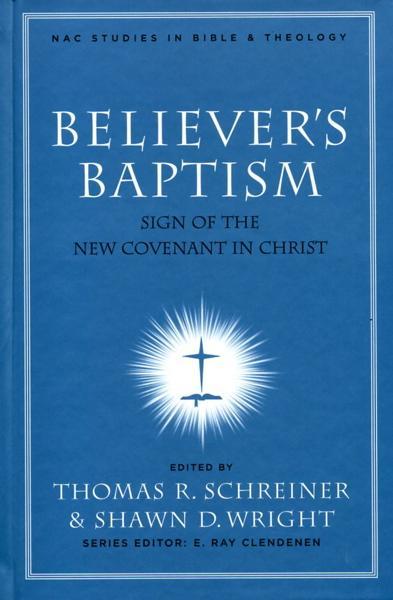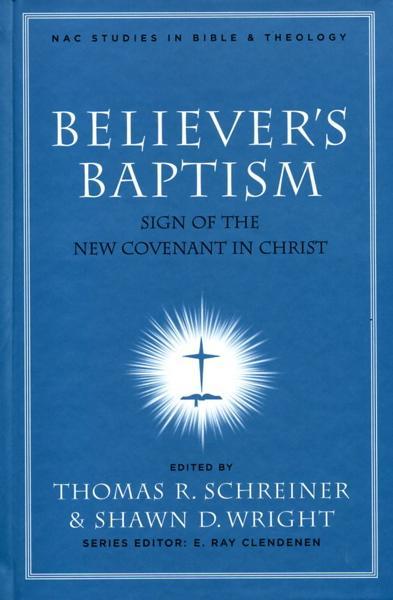Believer's Baptism: Sign of the New Covenant in Christ
Schreiner, Thomas R.; Wright, Shawn D. (editors)
9% off
Sold out
Sold out
$22.72
$24.99
Unit price
/
Unavailable
This product will ship directly from the publisher and you may not receive tracking. Learn More
Is believer’s baptism the clear teaching of the New Testament Scriptures? What are the historical and theological challenges to believer’s baptism? What are the practical applications for believer’s baptism today? Volume two in the New American Commentary Studies in Bible & Theology (NACSBT) series for pastors, advanced Bible students, and other deeply committed laypersons addresses these compelling questions.
Indeed, Believer’s Baptism begins with the belief that believer’s baptism (as opposed to infant baptism or other faith proclaiming methods) is the clear teaching of the New Testament. Along the way, the argument is supported by written contributions from Andreas Kostenberger, Robert Stein, Thomas Schreiner, Stephen Wellum, Steve McKinion, Jonathan Rainbow, Shawn Wright, and Mark Dever.
Staff Review: In recent years, the resurgence of Reformed theology within Baptist circles has produced deeper organizational links between Reformed Christians across denominational boundaries while also serving to refine the theological debate between credobaptists and paedobaptists. With contributions from leading Reformed Baptists such as Thomas Schreiner, Andreas Köstenberger, and Mark Dever, Believer's Baptism argues the credobaptist position with both conviction and fairness. Stephen Wellum's chapter, "Baptism and the Relationship Between the Covenants," stands out as an example of thoroughly understanding and fairly communicating the position of his paedobaptism brethren.
At the same time as the book advances the theological discussion by pointing to the biblical pressure points between the two sides, the book highlights the fundamental hermeneutical divisions. After his careful sketch of paedobaptist covenantal theology, Wellum begins his critique with a call for a moratorium on the use of "the covenant of grace" as a theological category because it flattens the diverse testimony of Scripture. While such a critique is potentially powerful for its rhetorical appeal to redemptive-historically sensitive Reformed Presbyterians, Anglicans or others, it seems to skirt the very point of contention: Where does one find continuity and discontinuity with respect to the children among God's people? In fairness to Wellum, he then argues in great detail marshaling biblical and theological evidence for his position. If there is an occasional cheap rhetorical jab, it is no more common than in the paedobaptist literature.
As Reformed Baptists continue to argue for a credobaptist position along increasingly consistent, Reformed theological lines, the entire discussion has improved. However, both sides must accept the frequently frustrating silence of the New Testament on this direct question and accept that both sides argue from broader theological concepts gleaned from the entirety of Scripture. The debate ultimately falls upon broader theological questions. Does Scripture teach a mixed or regenerate ecclesiology of the Christian church? Where does one locate the newness of the new covenant? Does a (non-presumptive) generational element remain within the new covenant? Believer's Baptism valuably moves the discussion forward with substantial reflection upon these important topics, even if it only further confirmed this crusty, young reviewer's covenantal paedobaptist convictions. - Matt Harmon, Westminster Bookstore Staff, April 2007
Indeed, Believer’s Baptism begins with the belief that believer’s baptism (as opposed to infant baptism or other faith proclaiming methods) is the clear teaching of the New Testament. Along the way, the argument is supported by written contributions from Andreas Kostenberger, Robert Stein, Thomas Schreiner, Stephen Wellum, Steve McKinion, Jonathan Rainbow, Shawn Wright, and Mark Dever.
Staff Review: In recent years, the resurgence of Reformed theology within Baptist circles has produced deeper organizational links between Reformed Christians across denominational boundaries while also serving to refine the theological debate between credobaptists and paedobaptists. With contributions from leading Reformed Baptists such as Thomas Schreiner, Andreas Köstenberger, and Mark Dever, Believer's Baptism argues the credobaptist position with both conviction and fairness. Stephen Wellum's chapter, "Baptism and the Relationship Between the Covenants," stands out as an example of thoroughly understanding and fairly communicating the position of his paedobaptism brethren.
At the same time as the book advances the theological discussion by pointing to the biblical pressure points between the two sides, the book highlights the fundamental hermeneutical divisions. After his careful sketch of paedobaptist covenantal theology, Wellum begins his critique with a call for a moratorium on the use of "the covenant of grace" as a theological category because it flattens the diverse testimony of Scripture. While such a critique is potentially powerful for its rhetorical appeal to redemptive-historically sensitive Reformed Presbyterians, Anglicans or others, it seems to skirt the very point of contention: Where does one find continuity and discontinuity with respect to the children among God's people? In fairness to Wellum, he then argues in great detail marshaling biblical and theological evidence for his position. If there is an occasional cheap rhetorical jab, it is no more common than in the paedobaptist literature.
As Reformed Baptists continue to argue for a credobaptist position along increasingly consistent, Reformed theological lines, the entire discussion has improved. However, both sides must accept the frequently frustrating silence of the New Testament on this direct question and accept that both sides argue from broader theological concepts gleaned from the entirety of Scripture. The debate ultimately falls upon broader theological questions. Does Scripture teach a mixed or regenerate ecclesiology of the Christian church? Where does one locate the newness of the new covenant? Does a (non-presumptive) generational element remain within the new covenant? Believer's Baptism valuably moves the discussion forward with substantial reflection upon these important topics, even if it only further confirmed this crusty, young reviewer's covenantal paedobaptist convictions. - Matt Harmon, Westminster Bookstore Staff, April 2007
Specifications
-
Cover Type
-
ISBN
-
Page Count
-
Publisher
-
Publication Date









